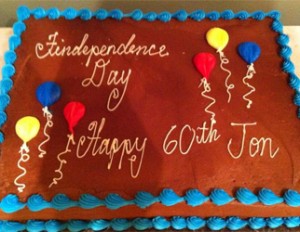The days after Findependence Day
The lines between work and leisure have blurred for MoneySense Editor Jon Chevreau, who celebrated the world's first Findependence Day party over the weekend.
Advertisement
The lines between work and leisure have blurred for MoneySense Editor Jon Chevreau, who celebrated the world's first Findependence Day party over the weekend.
 Those who follow my personal blog or social media feeds may have noticed over the past weekend that I claim to have hosted the world’s first Findependence Day party. As you can see from photographs posted on Facebook and Twitter, my 60th birthday party on Saturday featured balloons and fireworks—just like the cover of the new just-published U.S. edition of my financial novel, Findependence Day.
Since this is the Financial Independence blog, it may seem odd to some that I have so far refrained from comment on this here, particularly as today marks my one-year anniversary at MoneySense. Some might infer from this silence that since I can now take early Canada Pension Plan (CPP) benefits, that I have therefore chosen to do so, along with any employer pensions to which I’m entitled, and abandoned the workforce for a permanent vacation.
Those who follow my personal blog or social media feeds may have noticed over the past weekend that I claim to have hosted the world’s first Findependence Day party. As you can see from photographs posted on Facebook and Twitter, my 60th birthday party on Saturday featured balloons and fireworks—just like the cover of the new just-published U.S. edition of my financial novel, Findependence Day.
Since this is the Financial Independence blog, it may seem odd to some that I have so far refrained from comment on this here, particularly as today marks my one-year anniversary at MoneySense. Some might infer from this silence that since I can now take early Canada Pension Plan (CPP) benefits, that I have therefore chosen to do so, along with any employer pensions to which I’m entitled, and abandoned the workforce for a permanent vacation.
Share this article Share on Facebook Share on Twitter Share on Linkedin Share on Reddit Share on Email